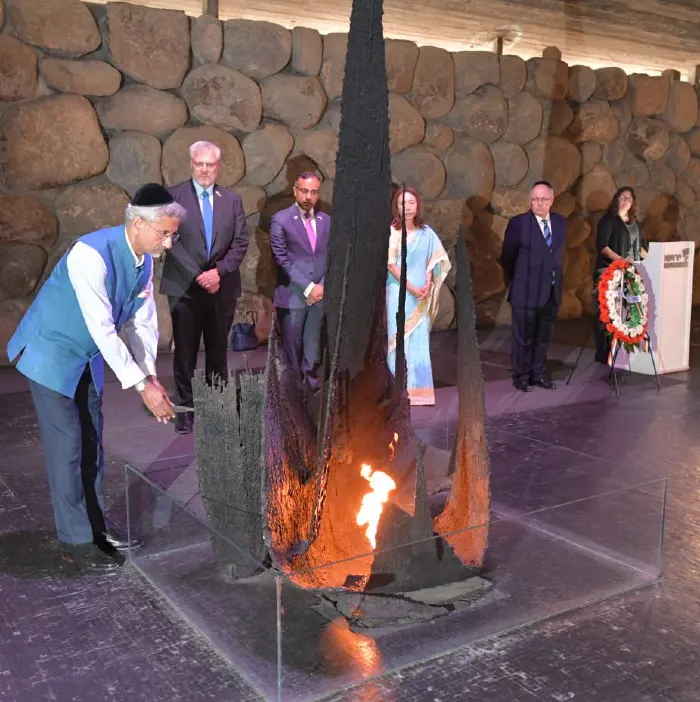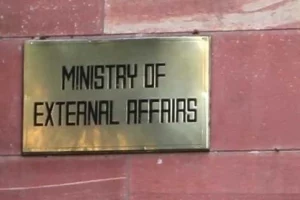Citing shared values of democracy and pluralism besides the long-standing cultural, economic and civilizational bond between the two countries, External Affairs Minister S Jaishankar has urged the Indian Jewish community and Indologists in Israel to deepen the discourse between one holy land and another.
Even though the real thrust remains on expanding the innovation and trade partnership between the two knowledge economies, Jaishankar expressed the urgent need to document the heritage and history of the community, as also the societal crossflows.
During his interaction with the community and scholars in Jerusalem on Sunday evening, the EAM said that both countries share similar guiding civilizational philosophies – Vasudhaiva Kutumbakam in India, or the world is one family, and Tikun Olam in Israel, or heal the world.
"We also share similar challenges to our society from radicalism and terrorism, apart from many other emerging developments on the geopolitical landscape," Jaishankar said.
He lauded Indologists for delving deep into Dravidian languages and literature, translating classical Sanskrit texts into Hebrew, devoting themselves to the study of Hindi literature, and even venturing into comparative studies of the two religions.
Jaishankar said that just like India, Israel too is a place that requires perhaps a lifetime to discover and understand.
While Israel and India established diplomatic ties in 1992, the Jewish and Indian people share a rich and deep relationship which dates back to ancient times.
Jews were one of the first foreign groups in recorded history to arrive and settle in India and became an integral part of Indian society.
Today, India boasts a vibrant Jewish community, which numbers close to 7,000, while Israel is home to 85,000 Jews of Indian origin.
"India's connections with Jerusalem goes back 800 years in time. One of our revered Sufi saints, Baba Farid, meditated in a cave inside the city walls in Jerusalem. And this place later has become a shrine and a pilgrim lodge for travellers from India. Today, this Indian Hospice symbolizes India's presence in the Old City," Jaishankar said.
In his address, the minister referred to The Talmud mentioning trade with India in ginger and iron and the Book of Esther calling India as Hodu.
He emphasised that that the Jewish Indian community has for over many centuries, contributed to the building of India in multiple ways.
"We often go around Mumbai and Pune not realizing that many landmarks were actually the contributions of this community, whether it is the Sassoon docks in Mumbai and the Sassoon Hospital in Pune. David Sassoon in fact, was one of the founders of the Bank of India. And some of you were of course by the side of Mahatma Gandhi during our freedom struggle," commented Jaishankar.
He also recalled the contributions of David Erulkar (a lawyer who defended Bal Gangadhar Tilak), Dr Jerusha Jhirad (who was awarded the Padma Shri), David Reuben (who served as the Chief Justice of High Court), three Jews who became mayors of Mumbai and another three – Vice Admiral J R Samson, Major General B A Samson, and of course, Lt. General J F R Jacob – who are even remembered today for their military service.
Jaishankar said that while Nissim Ezekiel was honoured with Sahitya Akademi Award, the signature tune of All India Radio was composed by a Jewish exile in India, Walter Kauffman.
The minister also mentioned the contributions made by the Jewish Indian community to Israel, like those by Lt. Ellis Ashton Asthamkar to the Hagana, agricultural scientist Eliayu Bezalel, and cardio-thoracic surgeon Dr Lael Best.
Both, Bezalel and Best, have been honoured with the Pravasi Bharatiya Samman award.
"What is equally important and interesting is that not only has the community carried some flavours of India with it here, but they have retained, or assimilated in some form, Indian traditions that in many ways now have become yours," mentioned Jaishankar .
He spoke on the influence of the mangalsutra and the mehendi among Bene Israelis, the distinctive Malida thali made by them, the practice of baat pukka for formalizing marriages among Baghdadi Jews, and symbolic adorning of the Torah arks with jasmine garlands and the use of manara by the Cochini Jews.
"You also adopted that very Indian tradition of removing shoes before entering the synagogue. And you all still remember our way of life, our languages, our festivals, and, I am told about the Maiboli journal in Marathi… It is, therefore, not surprising that people you say, Israel is my fatherland and India is my motherland," he said.
In modern post-Independence times, Jaishankar said, some major socialist political leaders and streams in India felt a kinship with the kibbutz movement in Israel.
"Jayaprakash Narayan, one of our most prominent political leaders and theorists associated with our Independence struggle, visited Israel in 1958, and many followers of Vinoba Bhave, another towering leader of our independence movement, visited Israel in 1960 to understand the kibbutz movement here," he said.
Jaishankar said efforts need to be made to make the younger generation of the community a part of this living bridge and enhance the reach of the work being done by the Indologists, both within the community and outside.
Also Read: Jaishankar invites Israeli companies to invest in India's post-Covid surge




















